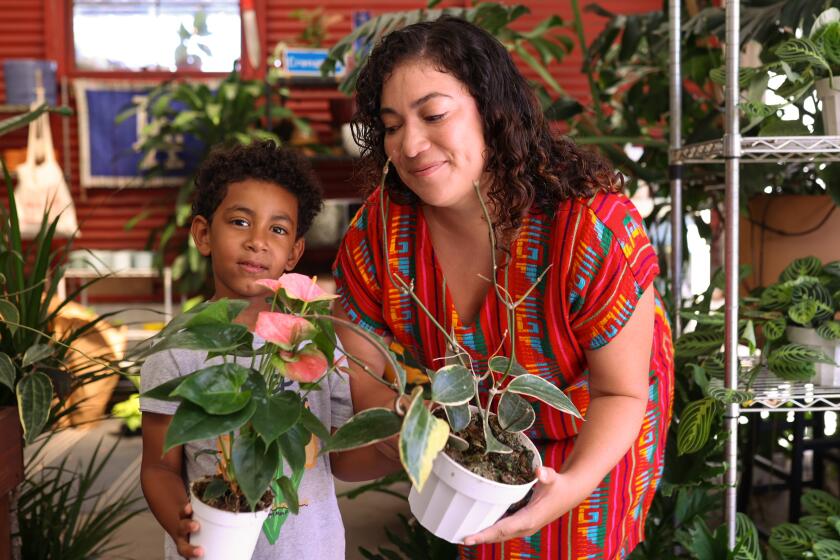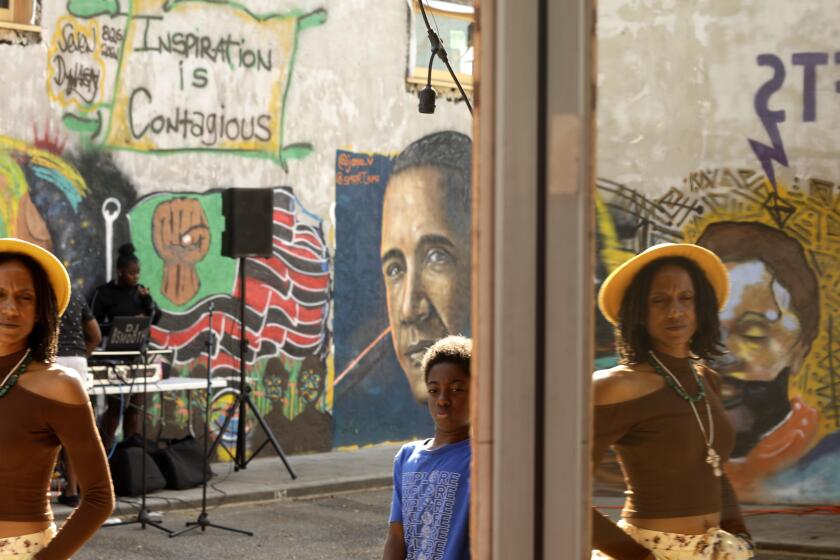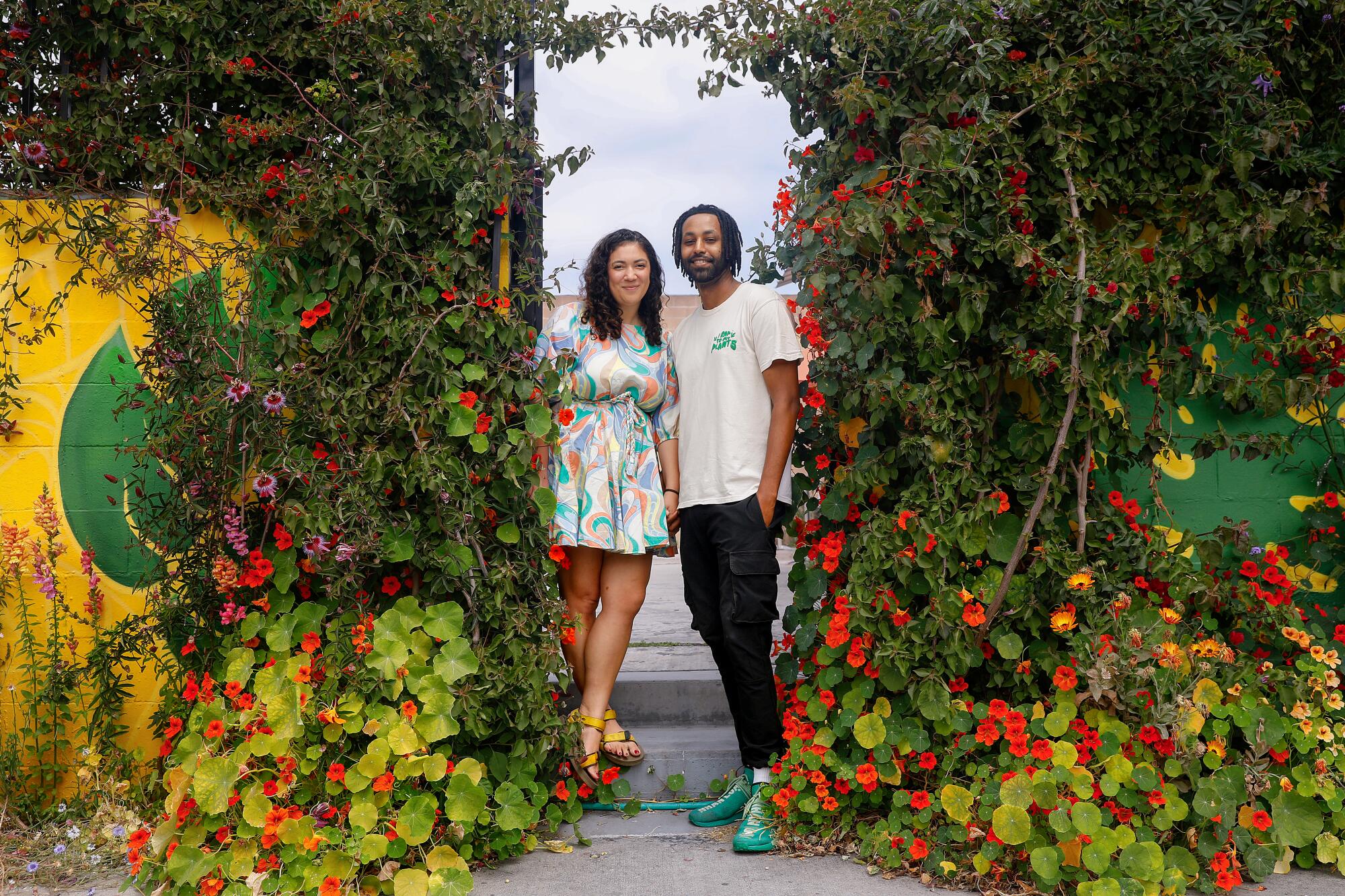
- Share via
When Sandra Mejia was searching for a location to open a storefront for the Plant Chica — the flourishing plant business she launched with her husband in 2018 — she looked no further than her South Los Angeles neighborhood.
After selling plants on street corners around L.A. and eventually from her parents’ backyard, Mejia said it was imperative for her to keep the Plant Chica in her community, which she describes as a green desert with limited parks and plant nurseries.
“This is where my roots are,” says Mejia. “I’m very passionate about my community.”
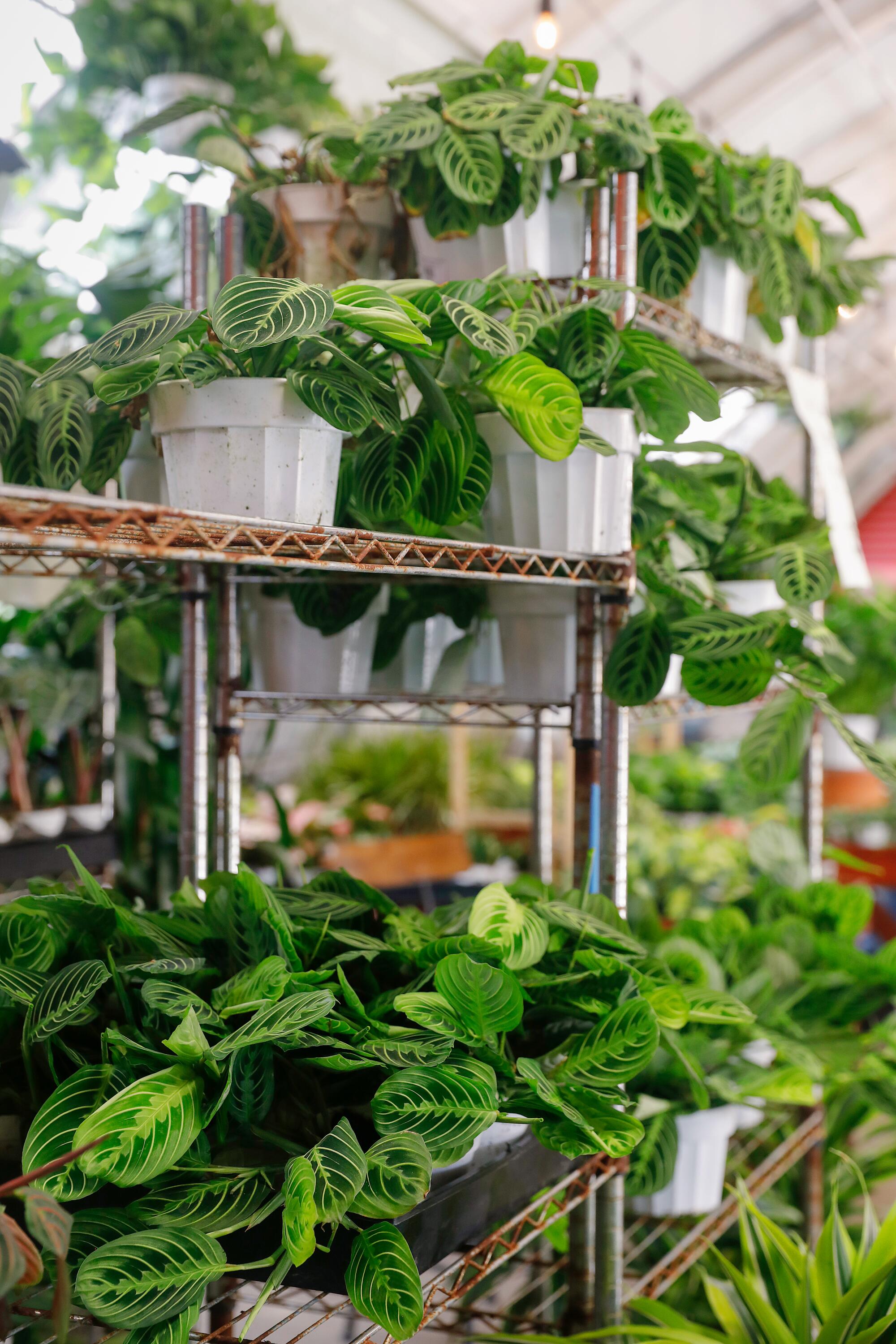
Finding property to lease in their neighborhood was difficult at first, but the couple eventually discovered an old auto shop on an unassuming corner of Jefferson Boulevard in West Adams. With the help of their family, creative friends and loyal supporters, they were able to transform it into a charming communal space where queer-centered poetry nights, free adopt-a-plant events, yoga classes, art exhibits and kids parties took place nearly every week since opening in 2021. Mejia and her husband, Bantalem Adis, strove to make the Plant Chica, which they affectionately call their “greenhouse,” more than just a plant shop. They wanted to build a haven where underrepresented people and those who looked like them could feel seen and catered to.
Now, the fate of the Plant Chica is in limbo as developers are planning to tear down the shop for new construction that could take up to two years to complete. After a 90-day notice, the couple has until June 30 to leave.
New development in L.A. can be tense, especially in communities like South L.A. as gentrification heats up. After Mejia received the “heartbreaking” notice that the Plant Chica would have to move, she shared the news on Instagram. Her emotional video attracted thousands of likes, and the property owner has since been keen on helping. Romie Chaudhari, one of the owners of the space, says he was “hurt” when he saw Mejia’s video and has since offered a few options to the Plant Chica, such as including the plant shop within the development project, helping them find a new space or selling them the property.
For Mejia, potentially having to move is one problem she’s come to peace with. Securing a long-term future for her family business in her area is a more painful problem, however.
“I’m not fighting my landlord to stay here,” she says, adding that she has no issues with her landlord or the property owners. “I’m also a businesswoman and I understand it’s business. You have plans for that space — it’s fine.
“My issue is the fact that there’s bigger developers that own so much land on Jefferson [Boulevard] and it’s sitting empty,” Mejia says. “And when we call, no one answers, and then when someone does answer, they say it’s not available, but they have a ‘for lease’ sign.”
She adds, “We want to keep providing space for our community, but we can’t because we can’t afford anything. That’s my issue.”
Mejia and Adis launched a fundraiser via GoFundMe this month, netting roughly $35,000 of their $100,000 goal to start anew. If the Plant Chica doesn’t reach its goal — the number likely will increase — it will operate as an online-only operation for the foreseeable future. Mejia didn’t expect Chaudhari to sell her the property, but she’s considering his offer if she can get funding.
They’d prefer to purchase property in South L.A. rather than lease because ownership will offer security and an alternative to “outrageous” prices. They initially didn’t think owning land in L.A. was possible for them as children of immigrants. Her family hails from El Salvador, his from Ethiopia. But they believe it’s their best option now.
“I think owning the land is just so important so this doesn’t keep happening,” says Mejia, fortified by the community support they’ve received. The Plant Chica also got $25,000 in venture capital support from the Annenberg Foundation last year, but the funds have already been spent on payroll and taxes and to support the business during slow winter months.
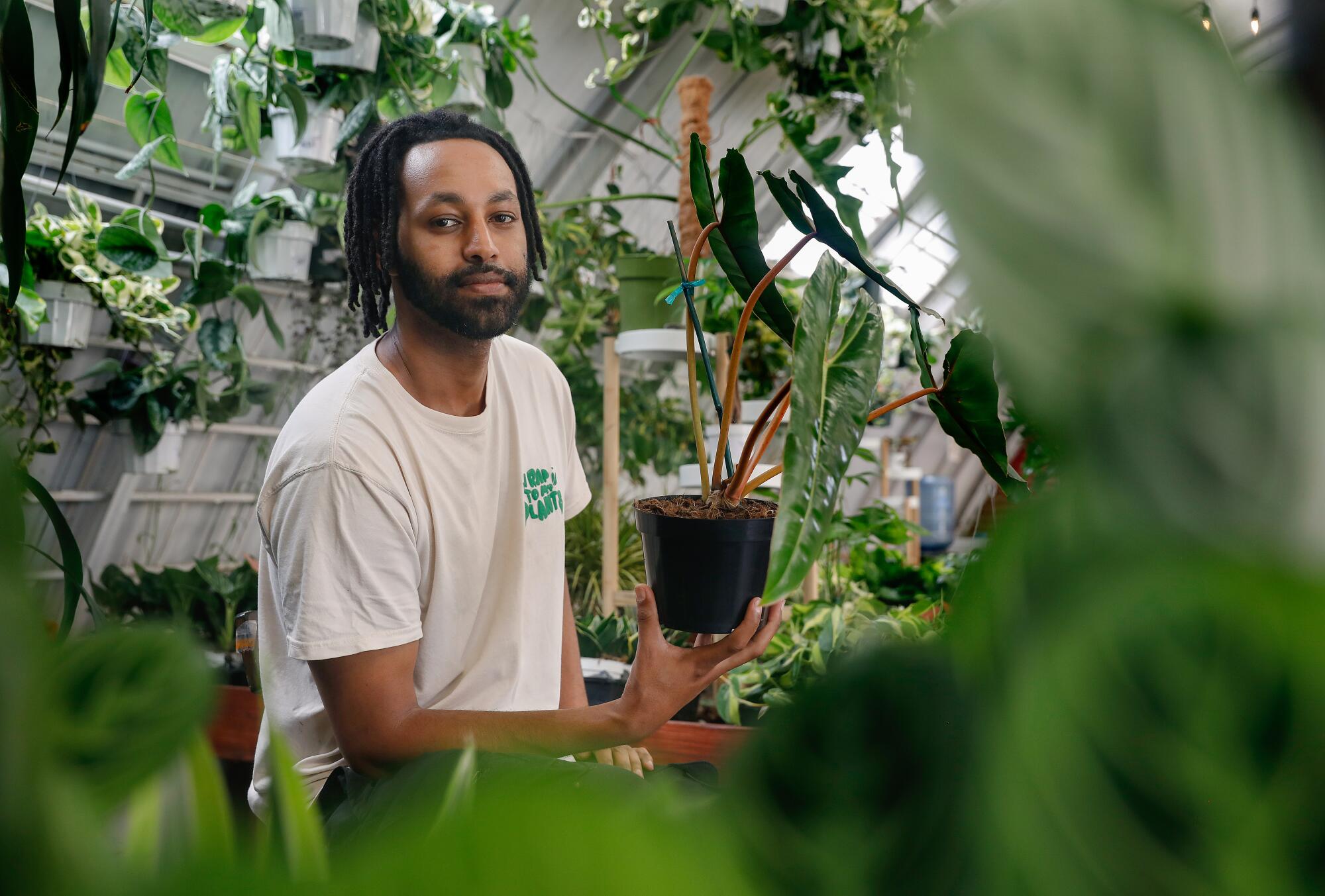
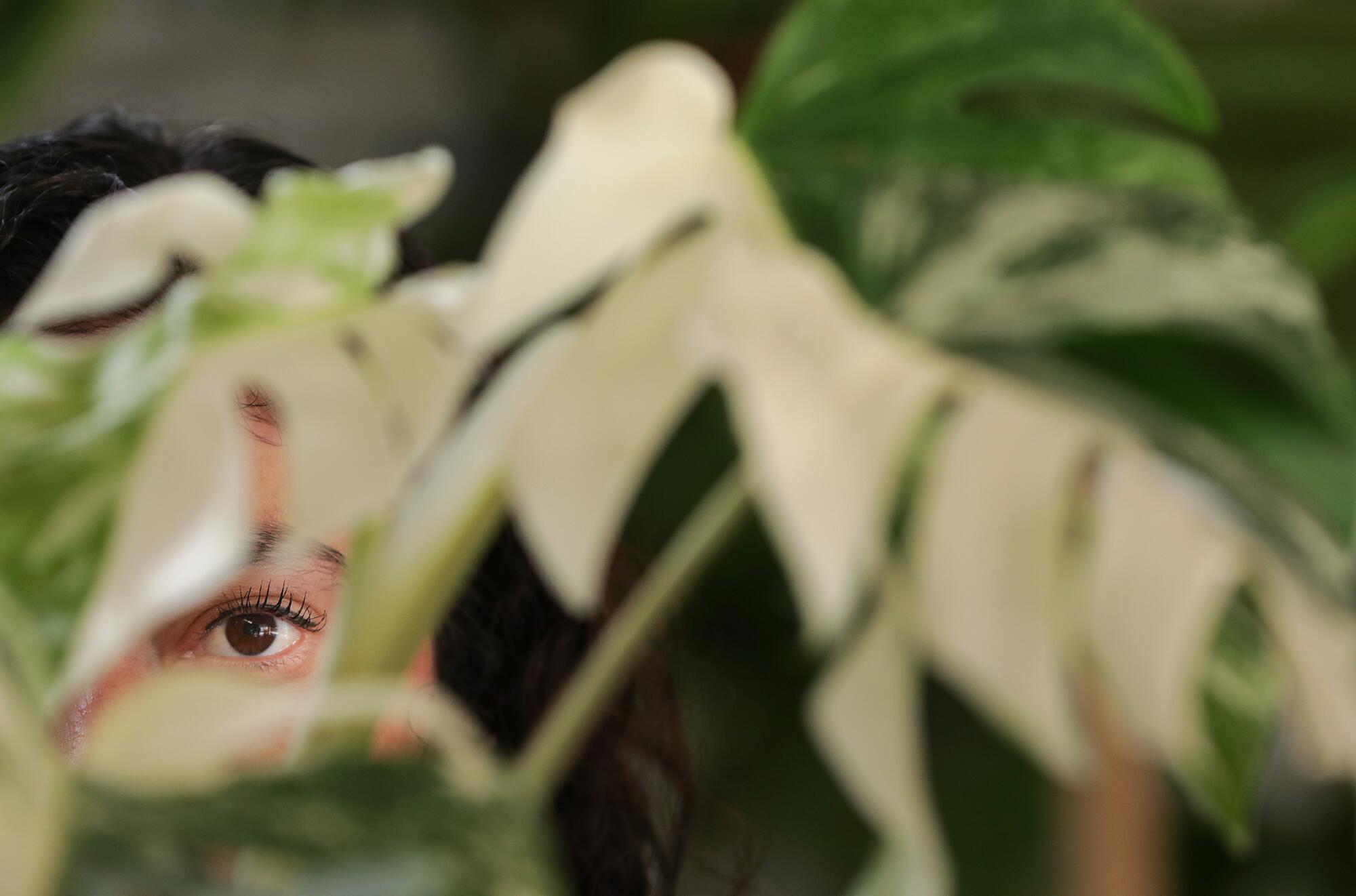
If the couple were to participate in the redevelopment project, they would have to leave their current space for roughly two years during construction.
“I know it’s not what we’re going to be looking for because we want that greenhouse feel,” Mejia says about being a part of the redevelopment project. “I don’t want like four walls and white [space]. I want it to feel like a greenhouse to our community. ... It feels like a different space when you walk in and that’s what’s so healing to people.” The Plant Chica would still have to relocate temporarily if the couple were to join forces with Chaudhari. He says he could offer her another space in the meantime.
Meanwhile, Mel’s Fish Shack, which has served fried fish in the area for decades, will be part of the project. Earlier this month, owner Georgette Powell was notified that she’ll have to vacate her space by May 2024 while construction is underway.
“I don’t know where I’m going to go, but I know I got to make this thing work,” says Powell of the construction period. “I got to be here for the community.”
Powell, who speaks lovingly of Mejia and Adis, says she understands their anxiety about the situation: “If you’re a small business and you don’t have major backing or a ton of capital set aside or family to just pay for it, then it’s kind of rough.” And as someone who has lived in the area for several years, Powell says she’s watched the neighborhood’s demographics change and property prices skyrocket. But she doesn’t consider Chaudhari’s team to be like other fly-by-night investors.
“[He’s] always been really easy to deal with,” Powell says, adding that he helped her financially when her business was slow during the pandemic. “I’ve ran into trouble and they’ve been understanding, and they worked with me.”
“I want them to understand that they have an ally in me and not an adversary,” Chaudhari says of the Plant Chica.
The Plant Chica provides an inclusive space offering poetry open mics, painting nights and children’s book readings in Los Angeles.
Mejia isn’t driven only by her business needs. She also cares for the communities her business supports.
“So many different organizations [and] so many different people depend on us,” she says. “They host events every month at our shop, and so it’s like, ‘Oh my God. Where are they going to go?’ I worry about that.”
Mel Douglas, founder of the Black Women’s Yoga Collective, which has held roughly 20 events at the Plant Chica over the years, says she hopes they are able to stay in the neighborhood.
“Sandra is one of the most community-minded people I’ve really ever encountered,” says Douglas, who used to live a few blocks away from the Plant Chica but now resides in Sherman Oaks. “She just has such genuine care for the community, and I’ve experienced it countless times, from her allowing us to have our events there for absolutely free. She’s never tried to charge us for the space or to charge anyone for doing the activities there.”
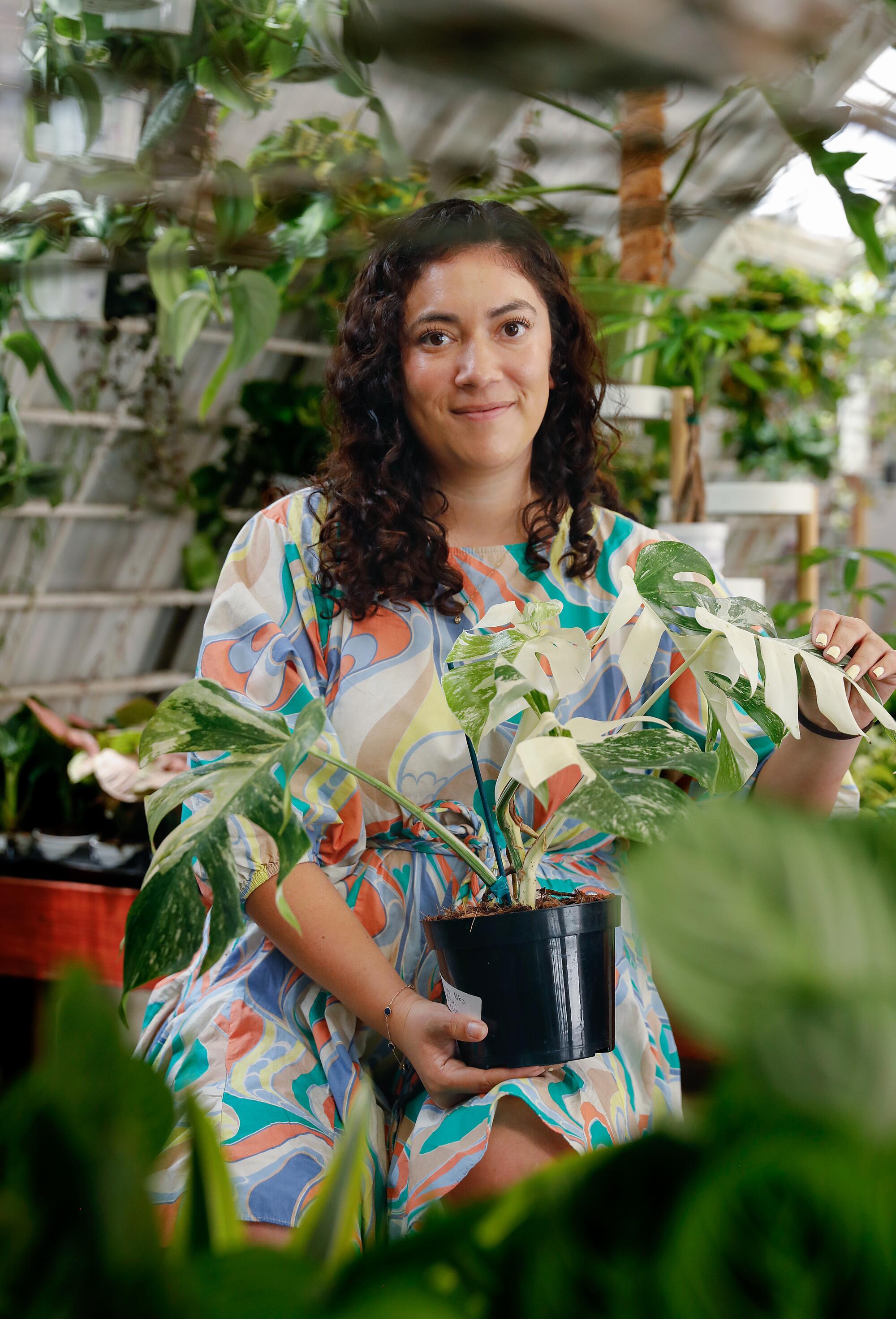
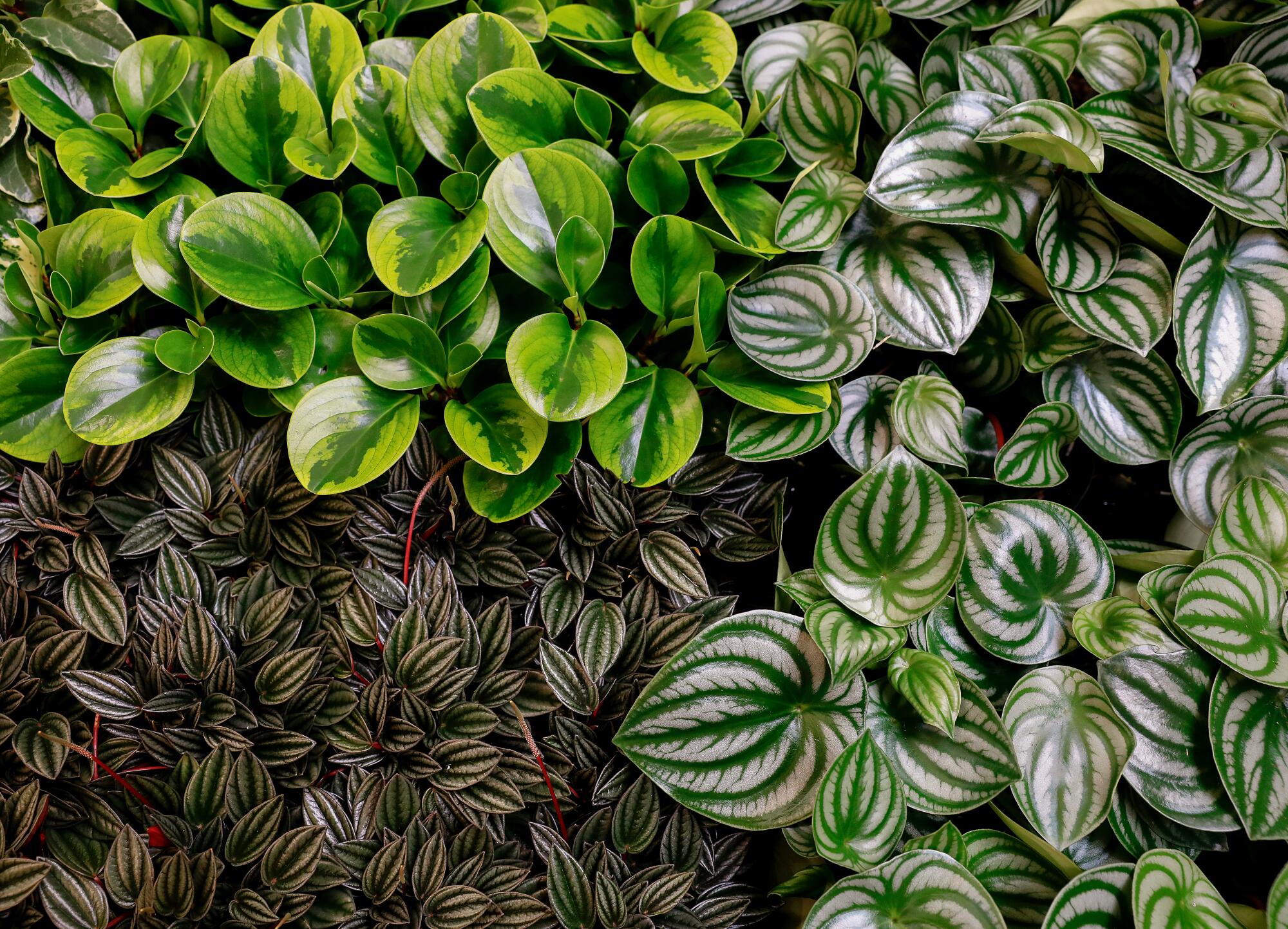
DeMarkus Trinidad Williams, who is the co-owner of Soul Food Candle Company and has participated in several events at the plant shop, says they admire the Plant Chica because it provides a “safe space” for Black and brown queer people, which is something they didn’t have growing up in Inglewood.
“So me being there and just being older now and witnessing so many of the queer youth being able to feel safe and seen, and also able to shop and find something that’s affordable and just be treated like a regular person with acts of kindness is beautiful. So for that to go away is really heartbreaking,” says Trinidad Williams. (They are planning to feature a donation box for the Plant Chica at their upcoming pop-up event at Santa Monica Place in June for Pride month.)
Sky-high housing prices, two new zoning laws and the sale of Baldwin Hills Crenshaw Plaza could be a tipping point for historically Black neighborhoods.
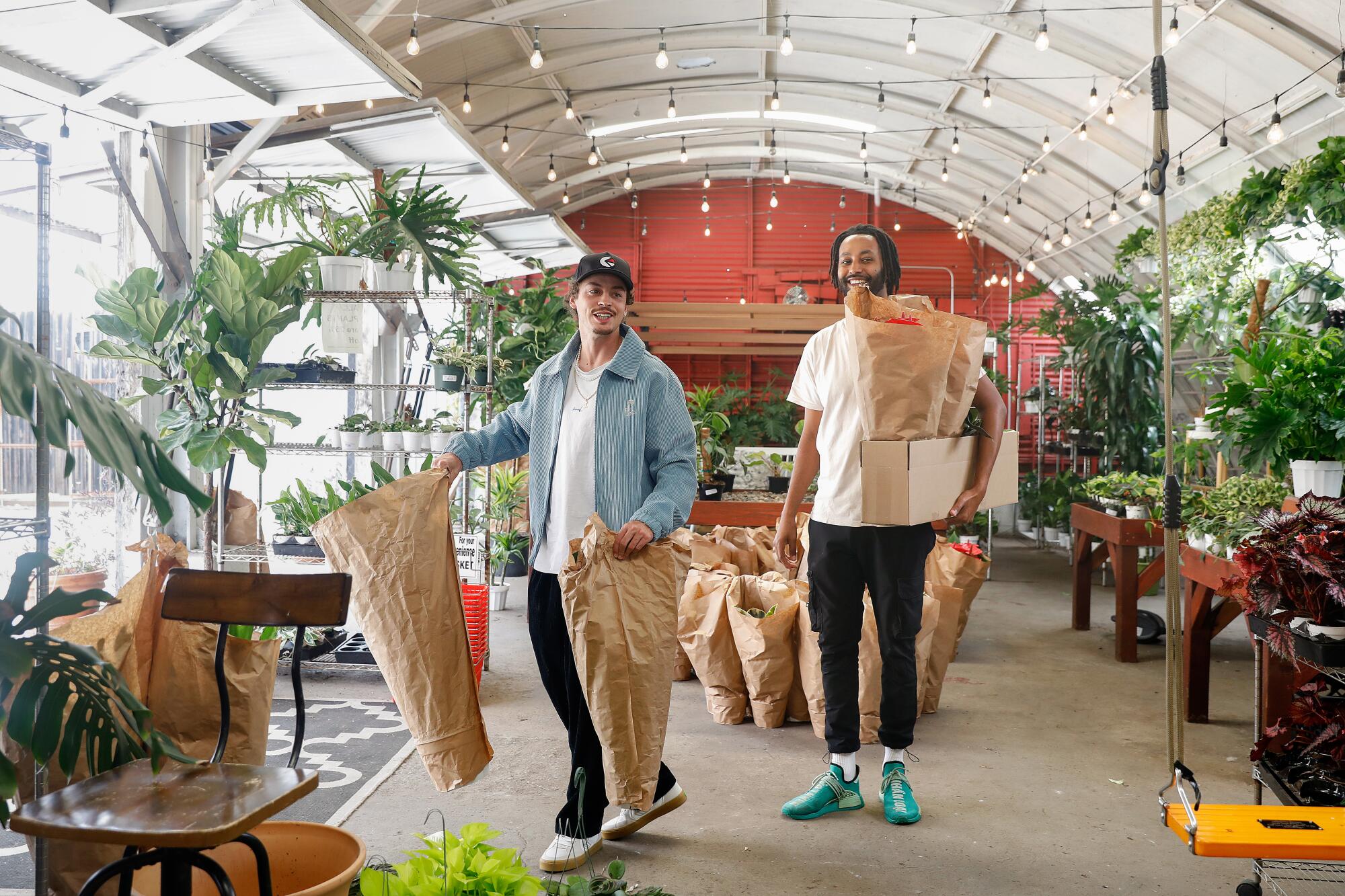
Mejia waited a few weeks to share the news about losing the property on social media because she didn’t want to distract from the activism around another “necessary” green space also at risk of closure. In April, developers suddenly put up a “for sale” sign on the Compton Community Garden, whose produce can feed 100 families a week. Another online fundraiser via GoFundMe netted nearly $500,000 and community garden leaders are negotiating to save the garden, according to a recent Instagram post.
Mejia says small businesses, which are vulnerable to “gentrification,” don’t always get to tell their story or ask for help, so they often just disappear from their communities without explanation. Mejia’s new “dream” is to team up with other Black- and brown-owned small businesses to buy land that they can all operate out of, sort of like the Slauson Super Mall, which hosts several like-minded businesses.
“I want to be there for these small businesses who can no longer stay in their neighborhoods,” she says. “Because it’s scary to feel like, ‘What do we do? I have no idea.’”
World on Wheels co-owner Tommy Karas said battles with his landlord and now the COVID-19 closure doomed the roller rink beloved by Black L.A.
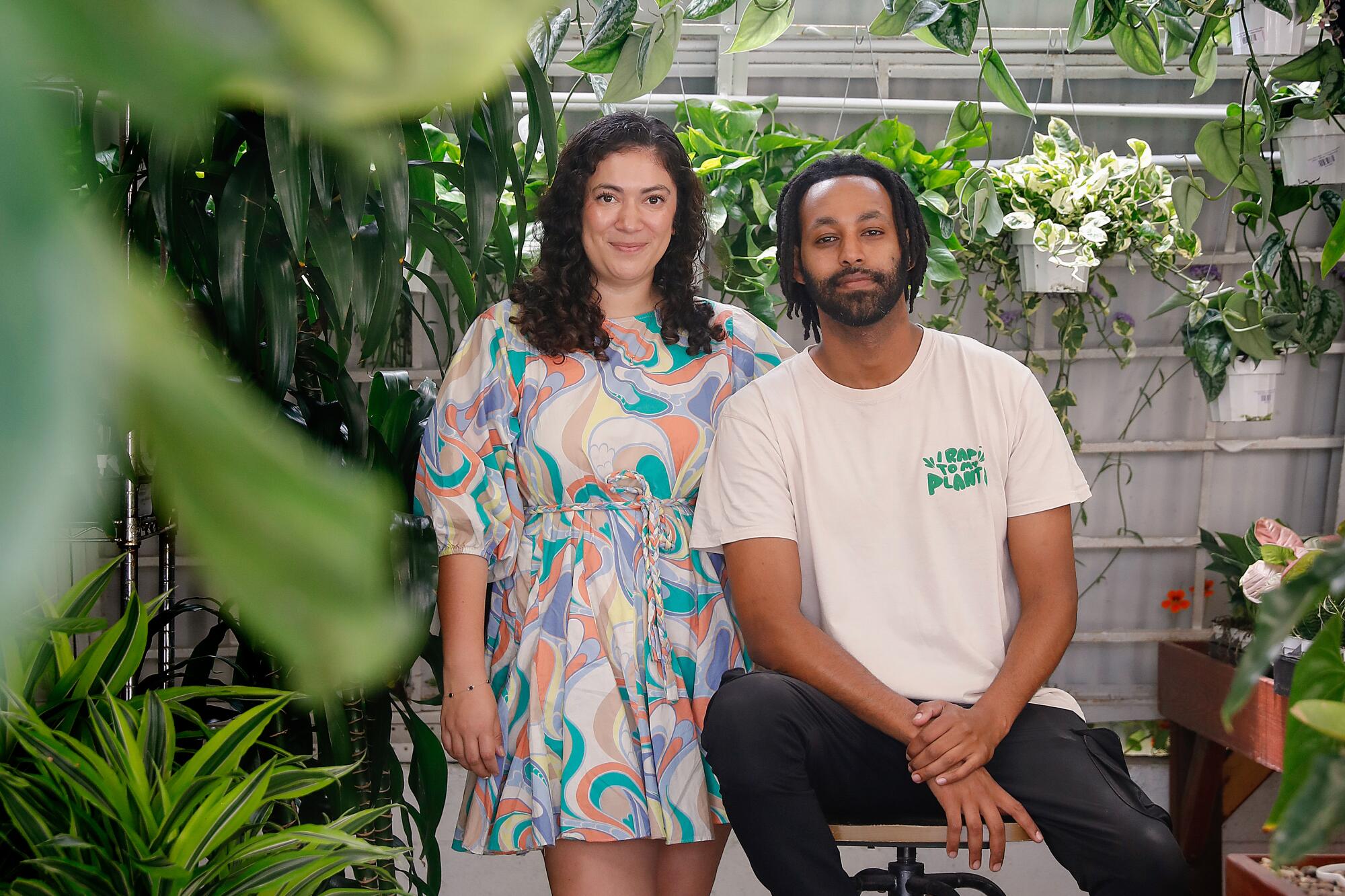
Though the ordeal has been stressful, it’s given her an even greater purpose, she says.
“For so long, so many of us felt this way about how the neighborhood’s changing, but we don’t say anything about it. Or if we do, we talk amongst ourselves. No one ever listens to us,” Mejia says. “So I feel like I’m becoming the voice for all these kids who grew up there, and it’s definitely not what I signed up for but I feel like it’s important.
“This is so much bigger than me and so much bigger than the Plant Chica.”
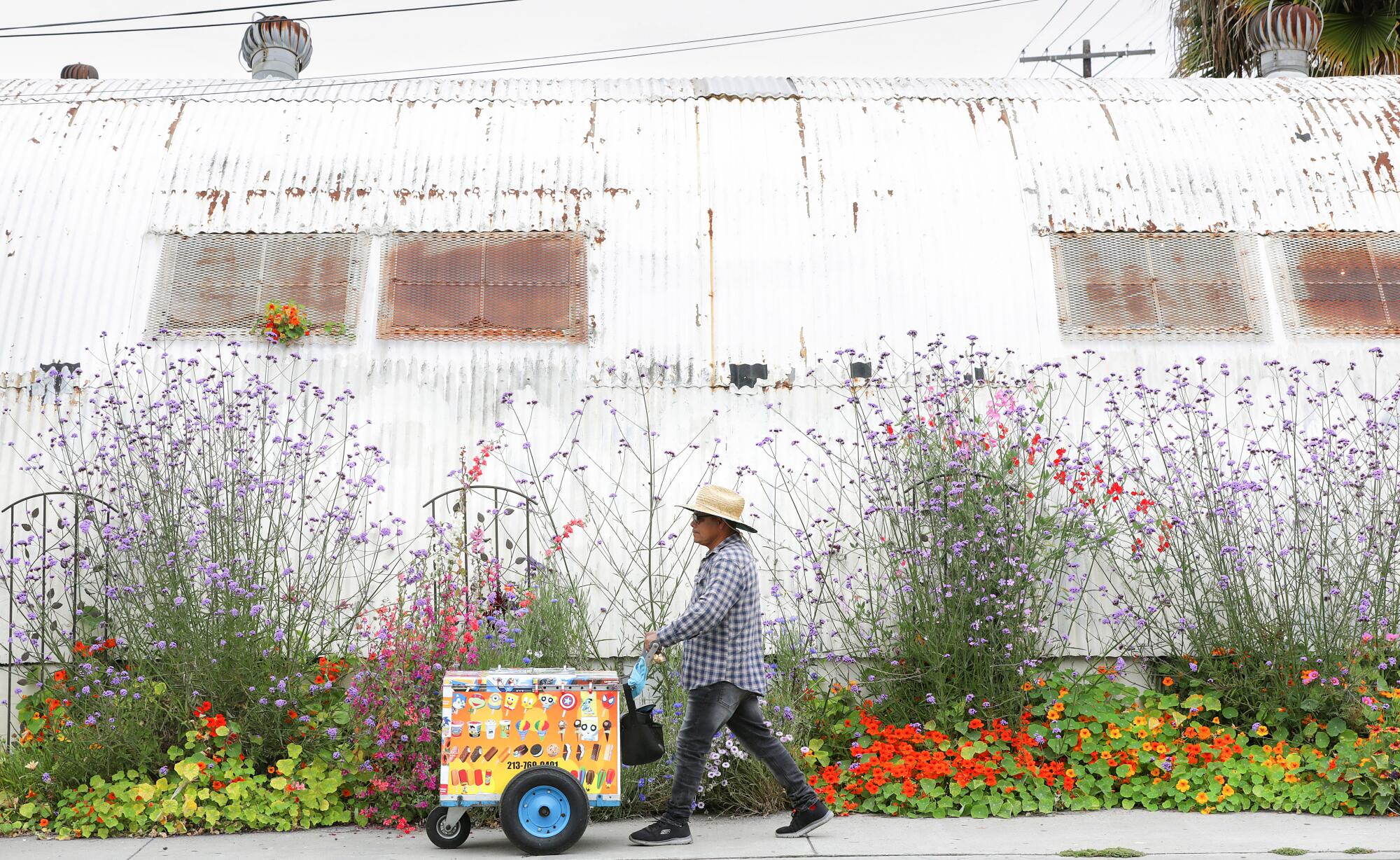
More to Read
Sign up for The Wild
We’ll help you find the best places to hike, bike and run, as well as the perfect silent spots for meditation and yoga.
You may occasionally receive promotional content from the Los Angeles Times.
